It is not
often that people almost completely change course in Hollywood.
However, after making two straight huge blockbuster films, Chris
Weitz has downshifted into the tiny independent drama A Better
Life.
However,
smaller is not necessarily a bad thing. Weitz started small when he
and his brother Paul directed the first American Pie movie, a
small movie made on a tiny budget which became an international
phenomenon. They followed it up with the hit adaptation of Nick
Hornby’s novel About a Boy.
Weitz has just spent the previous few years helming the special
effects extravaganzas The Golden Compass and Twilight: New
Moon. He was ready for a more intimate, human story.
Weitz knew
that he had to film A Better Life as soon as he read
the script. Weitz’s direction takes on renewed passion in
telling the story of an undocumented Mexican living in LA, trying to
get a little piece of the American dream for himself and his
teenaged son. The film takes a poignant look at an under-explored
part of Weitz’s hometown of Los Angeles. It also illustrates the
lives and hardships of an entire community of people who have become
a political piñata.
A Better Life
opened to
universally positive reviews and star Demián Bichir has just
been nominated for a Best Actor Oscar for his lead role.
The movie is now
being released on video,
on demand
and streaming.
Mr. Weitz was
kind enough to give us a call recently to discuss his career and his
latest labor of love.
I've got to say, A Better Life
is definitely a very different film than any you have
done before.
Yes. (laughs)
After being known for bigger,
more commercial and comic films, what was it about this project that
appealed to you?
At first it was just that it was
the best script I had read in twenty years of working here, the
script by Eric Eason. So, it wasn’t really a political motivation
at first. It was just self-interest. I really wanted to make a
good film and it was a totally entrancing script. Gradually, the
pieces started to come together. I remembered seeing Demián Bichir
in Che. I was keen to make a film at home, because now I’m a
family man, so it had to be made in Los Angeles. I was also keen to
learn to speak Spanish, because I am the grandson of a Mexican and a
son of a German, but I’ve lost a lot of those cultural roots. So,
it was a chance for that. It wasn’t until later that it really
became a political thing.
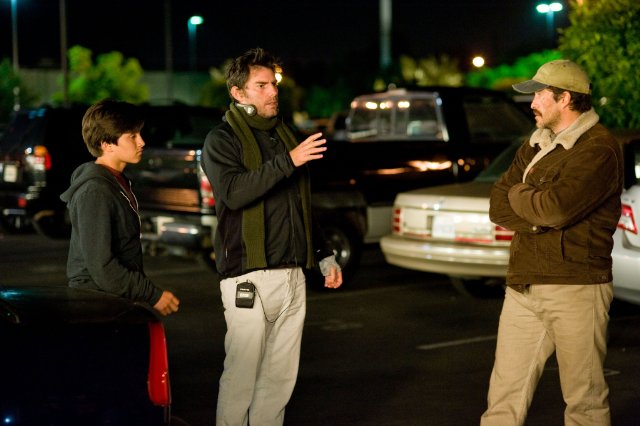 After doing back-to-back huge
films like
Twilight: New
Moon
and
The Golden Compass,
was it a bit of a culture shock going back to do a tiny, personal story
like
A Better Life?
Was it a refreshing change for you to work on a film like this?
After doing back-to-back huge
films like
Twilight: New
Moon
and
The Golden Compass,
was it a bit of a culture shock going back to do a tiny, personal story
like
A Better Life?
Was it a refreshing change for you to work on a film like this?
Well, it was refreshing. It
really wasn’t a shock, in as much as one still does the same kind of
stuff. You’re still trying to convince people that what you are
doing is real. It’s harder than you’d think in this case, because I
didn’t really know the world that I was going into. I didn’t know
the world of East LA. I didn’t know the world of undocumented
immigrants. And gang members. I had to learn a lot about that, so
there’s a heavy research component. What there wasn’t – which was
great in this regard – was all of the work that you have to do to do
CGI on one of these major films. (Chuckles) What nobody
tells you is that what you used to think of as the editing period is
still the shooting period, in the sense that you’re making these
effects… or you’re directing the making of these effects. So that
doubles your workload. Here, we could really concentrate on the
performances.
It’s interesting, because
people have a tendency to see Los Angeles as this big, rather
glamorous place, but when you drive around you see so much more
diversity. Was it interesting to you to be able to chronicle some
of the areas in LA that people don’t get to see so much?
It was interesting to me as
an Angelino to get to know my city. One half of it is Hispanic. It
was a tremendous benefit to me. Cesar Chavez [Avenue], which is
kind of the eastern-most bit of Sunset Boulevard, is the most
interesting street in the entire city. In some places it feels like
a bit of Mexico. In some places it feels like some kind of hybrid
of the two. It’s an incredibly lively place. There are also, of
course, places that are really – in some ways, literally – under the
gun. That’s not necessarily from gangs. It can also be from a
police department that has kind of used social chemotherapy to get
rid of the gang problem – but taking solutions that damage
everybody. For instance, in Ramona Gardens, the housing project in
which we shot, the government of the city had mounted these huge
spotlights that shone down on every public space. That also shone
into people’s houses. It’s a tremendous nuisance for everyday
people just trying to get on with their lives. That’s most of what
goes on in East Los Angeles, people just getting on with it.
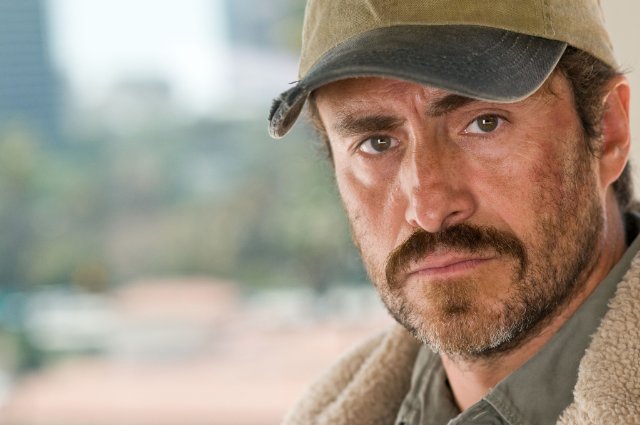 As a director, were there
special challenges to doing an English film that has a significant
amount of dialogue in Spanish?
As a director, were there
special challenges to doing an English film that has a significant
amount of dialogue in Spanish?
Well, in a funny way, I didn’t
have to learn Spanish, because of course you go to East LA and
everyone is used to the dominant culture and can communicate in that
way. To speak some Spanish was a sign of respect to what is the
main language there. The times it was most useful were in
communicating with my DP, Javier Aguirresarobe, who is a great
Spanish cinematographer. Also, we had three actors who came up from
Mexico in order to be in this film. Demián speaks wonderful
English, but to communicate with Joaquín Cosio and with Dolores
Heredia, who played Demián’s boss and his sister, it was important
to me to be able to speak to them a bit in their own language. Now,
you can’t learn a language that quickly. No matter what people say
about how easy Spanish is, in fact it’s a very difficult language to
acquire because there are so many variations of it. But it was
mostly useful in terms of showing that we as a crew cared about what
we were doing enough to get the details right.
Demián Bichir was nominated for
an Academy Award the day before yesterday for his role in the film.
When he was cast in the film, did you realize that you had found
something really special?
I knew he was really special from
his performances in Che, [Steven] Soderbergh’s film, and from
his films in Mexico. I knew that the role was one that was
Oscar-worthy and I had a feeling that this day was going to come.
Of course, there’s a big difference between that and campaigning for
this result in such a way that you can compete with the studios with
tremendous advertising budgets for the Oscars and with tremendous
stars who are household names. So, this is a big victory, not just
for Demián, but for acting quality in general, as being recognized
by the Academy. Also, this extra element of the fact that he’s
playing an undocumented immigrant – the Republican debates have been
so involved in slandering immigrants. We have a chance to give a
voice to eleven million people who work really hard in this country
to make everyone’s life easier.
Obviously, illegal aliens are a
bit of a political hot potato these days, was it important to you to
show a different side of the debate?
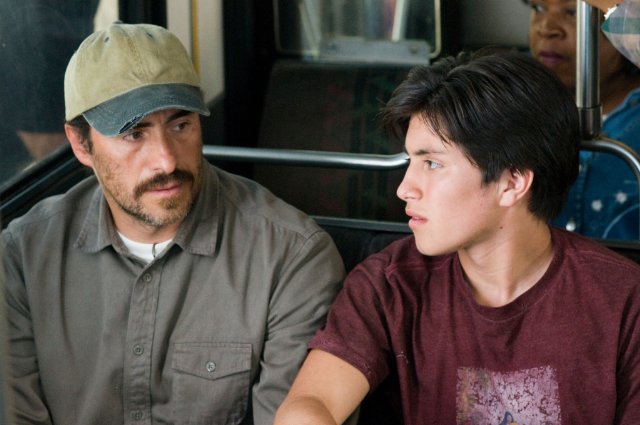 It’s really important, because
these guys have been a punching bag, politically. They can’t answer
back, because to answer back is to expose oneself to the possibility
of deportation. What these people want is to work hard. To do jobs
that we are not willing to do ourselves. And to have a chance to
become Americans. A lot of people say, “Well, if they just went
through the steps to be legal, it’d be fine. They could stay.” But,
when these people try they are often robbed by lawyers and denied by
the system. We need to recognize that these are people that we need
here. Because there’s been higher unemployment in this country,
it’s been easy for politicians to say that the undocumented are
somehow involved in this problem. It’s not the case. When you look
at Alabama HB 56, the most restrictive immigration law in the
country: that is doing economic damage to the state, because the
agriculture businesses that depend upon this labor are suffering.
People won’t pick those fruits and vegetables.
It’s really important, because
these guys have been a punching bag, politically. They can’t answer
back, because to answer back is to expose oneself to the possibility
of deportation. What these people want is to work hard. To do jobs
that we are not willing to do ourselves. And to have a chance to
become Americans. A lot of people say, “Well, if they just went
through the steps to be legal, it’d be fine. They could stay.” But,
when these people try they are often robbed by lawyers and denied by
the system. We need to recognize that these are people that we need
here. Because there’s been higher unemployment in this country,
it’s been easy for politicians to say that the undocumented are
somehow involved in this problem. It’s not the case. When you look
at Alabama HB 56, the most restrictive immigration law in the
country: that is doing economic damage to the state, because the
agriculture businesses that depend upon this labor are suffering.
People won’t pick those fruits and vegetables.
Your career has encompassed all
sorts of genres – romantic comedies, fantasy blockbusters and now
small independent dramas. Do you enjoy being able to stretch in all
sorts of varied directions as a director? Are there types of films
you feel more or less comfortable with?
I feel equally uncomfortable in
all genres. (laughs) I mean, my attitude is, if I do a
film, I’m going to spend one to two years… sometimes three years… of
my life on it. I will probably put myself through – because of the
person that I am – real physical and mental rigors in order to do
that. I will neglect my wife and child (laughs again) and
lose contact with my friends. So, I don’t want to do the same movie
twice. Now, I think about it as like being a character actor. They
get to do all kinds of roles. I’d like to be able to do that too,
as a director. I keep learning. One of the great things about this
movie was getting to learn more about the world. More about
politics. More about Hispanics. More about Spanish.
You did some acting in
Chuck and Buck,
as well as doing a few other small performances in
other projects like
Mr. & Mrs. Smith. Do you enjoy acting and would you
like doing more? How did the experience of acting help you as a
director?
It certainly helps me as a
director, because I understand it is not an easy thing to do. When
you’ve got 70 people and a big camera looking at you, it’s rather
difficult to impersonate another human being. I don’t think I’m a
very good actor. (chuckles) And I don’t think I’m very
comfortable doing it. But, it was important for me to do that. A
couple of days ago, I had a manager for about two hours. He said he
was interested in representing me and my vanity took me over for
about 120 minutes. Then I called him and said I don’t think this is
a good idea. I’m just going to end up wasting your time.
(laughs) Because, to be honest, the offers haven’t been rolling
in. That’s okay. That’s okay, because I got a couple of nice
notices for Chuck and Buck because the character I was
playing was deeply uncomfortable in his own skin. Well, that’s kind
of how I felt in front of the camera, so it was an easy role to
play. I think anything else would be a stretch.
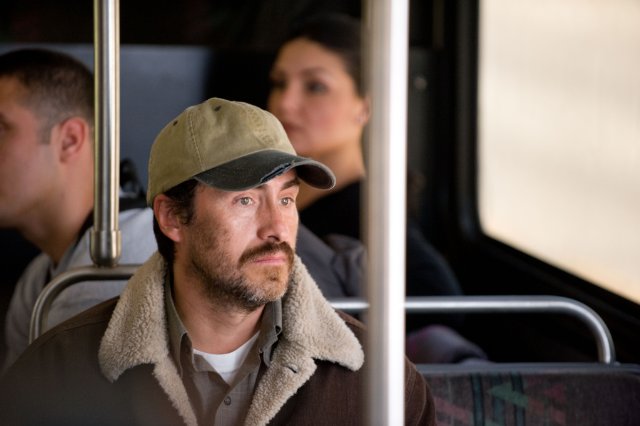 You and your brother hit
paydirt with your first very film. What was the experience of
making
American Pie like? Were you surprised by how
popular it became?
You and your brother hit
paydirt with your first very film. What was the experience of
making
American Pie like? Were you surprised by how
popular it became?
It was fabulous. We had pretty
free reign, because the studio was also working on some more
expensive films. We couldn’t afford big movie stars at the time, so
we were able to cast whomever we thought was best for the part. It
was a bunch of people doing something for the first time. That was
completely delightful. We didn’t expect it to do as well as it
did. We hoped it would make its money back, but the fact that there
is now going to be a fourth movie in the series is completely nuts.
And great.
Like you
said, they are making yet another
American Pie
movie. Obviously, you have not been a part of the
franchise since the original film – which I think was by far the
best one. Have you kept up on the progress of the series? They
even had those straight-to-video American Pie Presents
movies. Have you been shocked by how far this series has gone?
Yeah. It’s amazing how prolific
[it’s become]… these characters that Adam Herz invented really
seized upon people’s consciousness. People identified with them and
they still do. I think it’s also a measure of this new media world
that we live in that people can watch things again and again on
video and streaming. So their sense of identity is even deepened by
repeated viewing.
I’ve got to tell you;
About A Boy
is one of my favorite films.
Thank you.
What was the experience of
adapting that novel and what was making it and working with Hugh
Grant like?
It’s a terribly clever, insightful
novel, so the first thing you want to do is be very careful about
what you include and what you exclude. And what you synthesize in
terms of bringing to the screen. You’ve got a much shorter time to
get these things across. It was a wonderful challenge. It was
great that Nick Hornby was so supportive in letting us take his baby
and run with it. Working with Hugh was fantastic, because he is
immensely clever. He was kind of like the third writer on set.
Given that he makes what he does look quite easy, you’d be surprised
how much work and thought goes into it.
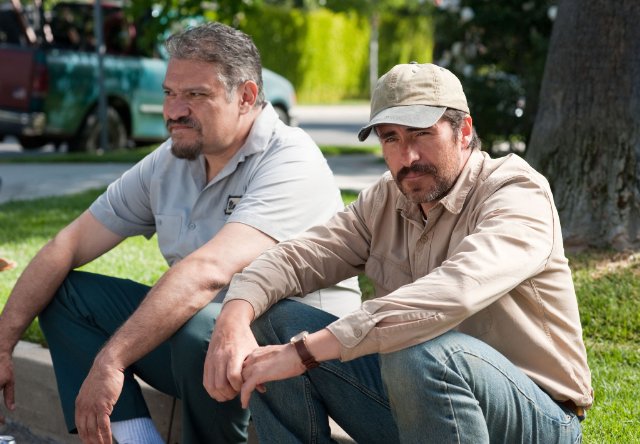 You have not written a
screenplay since
About a Boy,
instead focusing on the directing side. Do you ever
get the urge to go back to the writing side for some of your
projects?
You have not written a
screenplay since
About a Boy,
instead focusing on the directing side. Do you ever
get the urge to go back to the writing side for some of your
projects?
Sure. I’m thinking of going back
to writing screenplays for a while, because I can do it in my
hermitic fashion. Now that I have a four and a half year old, it’s
more important that I be around. I will write more. I enjoy that…
when it works. (chuckles)
Just as a viewer, what type of
things do you tend to watch?
Well, it’s fairly eclectic. To be
honest, I don’t find much reason to go out to the movies these
days. (laughs) I hope nobody from the MPAA is reading
this. I think there is only so far we can go with robots as
heroes. However, the last film I saw in the theater was they were
showing Lawrence of Arabia from a 70mm print at the Egyptian
[Theater] here in LA. That renewed my faith in film, because it’s
so astounding. I am trying to catch up with Japanese filmmaking.
Not just the classics, but the stuff that they are coming out with
nowadays, because that is a country that fascinates me. Also,
because if you look at it, and look at the results of American
movies in Japan, their own domestic films are battling off these
megalithic American films, because they’ve got their own thing
going. I want to understand more about that.
What were some of the movies
that inspired you to take up filmmaking as a career?
Well, I saw Star Wars at
age seven. I think a lot of people would say this, that when they
saw that – especially as a child – it expanded for them the sense of
what a movie was. I really didn’t know the difference at that point
between a movie and a lived experience. So there is something about
the magic of that first movie that got into me. But if you look at
the stuff that inspires… other things that we’ve done, I guess…
screwball comedy played a big part. Preston Sturges. Billy Wilder,
although he’s not screwball comedy, per se. Classic
Hollywood films meant a lot to me and my brother as we were growing
up, which is why we tend to try to have strong character roles.
What do you have coming up
next?
Right now, I’m working on some
short pieces for the Center for American Progress, which is a
progressive think tank in DC. They got in touch with me about the
film and have been very supportive. Part of their organization is
devoted towards immigration reform. I’m doing some short pieces
about Alabama HB 56, which is a catastrophically bad piece of
legislation.